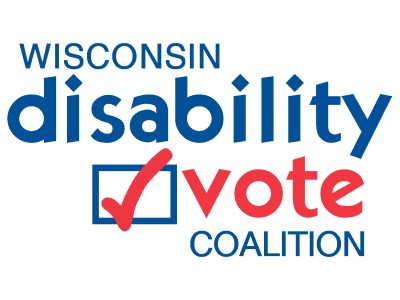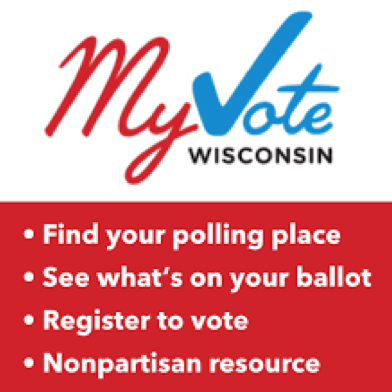
|
|
|
Voting News from the Disability Vote Coalition
|
The Wisconsin Disability Vote Coalition is a non-partisan effort to help ensure full participation in the electoral process of voters with disabilities.
|
Please share the information in this newsletter!
|
|
|
|
August 13th Primary Election
|
The August Primary is coming quickly! Mark your calendar for August 13, 2024 – Primary Election Day.
|
Here are some important election deadlines to keep in mind:
|
- July 24 - last day to register online or by mail (if mailing envelope must postmarked July 24). After this you must register in person at your clerk’s office or at an early voting site.
- August 9 - Last day to register at your Municipal Clerk's office.
- August 1 (suggested deadline) to request an absentee ballot. August 8 (statutory deadline) We encourage you not to wait until August 8 because it will be very difficult to receive and return your ballot by mail in time for the election. Absentee Ballots must be returned by election day. Be sure to check with your clerk to find out where to drop it off on election day.
|
|
|
Special Elections this Summer and Fall
|
The Governor has called special elections in both State Senate District 4 and Congressional District 8. Special elections often fly under the radar for most voters, so it’s important to plan ahead.
|
Voters in State Senate District 4 mark your calendars and make your plan to vote in this important special election. The winner of this special election will complete the remaining term of State Senator Lena Taylor.
|
- Special Primary - July 2 (Early voting begins June 18)
- Special Election - July 30 (Early voting begins July 16)
Voters in Congressional District 8 will have a Special Election to fill the unfinished term of 8th District Congressman Mike Gallagher. Of note, this Special Election will occur at the same time the August Primary (8/13) and the November Election (11/5).
|
This means that the office of Representative to Congressional District 8 will appear TWICE on voter’s ballots - once for the Special Election and again for the General Election. Voters should be prepared to vote in both contests.
|
The winner of the Special Election will complete the remainder of the current term and the winner of the General Election will serve the next term, beginning in January 2024.
|
As we get closer to the elections, be sure to check VOTE411.org for information about the candidates.
|
|
|
|
August 13 Federal Funds Constitutional Amendment Questions
|
Wisconsin voters will be asked two questions to amend (change) the constitution on their August ballot. These potential changes will impact both the process for distributing federal money, and who has the power to make those decisions. These changes will impact a wide range of issues voters care about, from education to the environment to how quickly the government can respond to emergencies (like a public health crisis or a natural disaster).
|
REGISTER TODAY! WI DISABILITY VOTE COALITION’S CONSTITUTIONAL AMENDMENTS AND FAIR MAPS WEBINAR
|
Constitutional amendments will be on the ballot again in August. Changing our constitution is a big deal. Join us to learn what they’re about. We will also talk about how the new maps may impact you, what else is on the ballot, and how you can be prepared.
|
June 25, 2024, 12:00 – 12:45 pm via Zoom
|
|
|
|
Voting Rights of Wisconsin Care Facility Residents
|
|
On April 11, the Wisconsin Disability Vote Coalition issued a statement regarding voting rights of Wisconsin residents in care facilities.
|
In Wisconsin, approximately 17,500 individuals reside in nursing homes [1]; thousands more reside in adult family homes (AFHs), community-based residential facilities (CBRFs), and residential care apartment complexes (RCACs). The voting rights of these residents are no different than any other Wisconsinite: every person eligible to vote in Wisconsin, regardless of their living situation, maintains that eligibility unless a court determines they are not legally competent and removes their right to vote.
|
The reasons people live in care facilities are varied: some people are in facilities for a few days or weeks after being discharged from a hospital or for rehabilitation, while others may live in a care facility for many years. Some are there because they have care needs that cannot be met in a different setting, and some individuals are forced prematurely to reside in a nursing home or other facility because of a lack of available care or affordable or appropriate housing opportunities in the community. Regardless of the reason for or length of stay in a care facility, the voting rights of these residents are retained unless a court determines otherwise.
|
Affirming and supporting the voting rights of care facility residents is a priority for the Wisconsin Disability Vote Coalition, and we welcome the opportunity to provide education and support to individuals, families, communities, and organizations – including care facilities – across the state regarding these issues.
|
|
|
|
Teams of people work together at every polling place to make elections happen. When people with disabilities join the team, they enrich everyone’s experience. This fact sheet will help you learn if being a poll worker matches your skills and interests.
|
|
Check out our new fact sheet on becoming a poll worker and consider helping to make the next election happen!
|
|
|
|
VOTING QUESTIONS?
Help is available! Contact these resources:
|
|
|
|

|
|
|
|
|